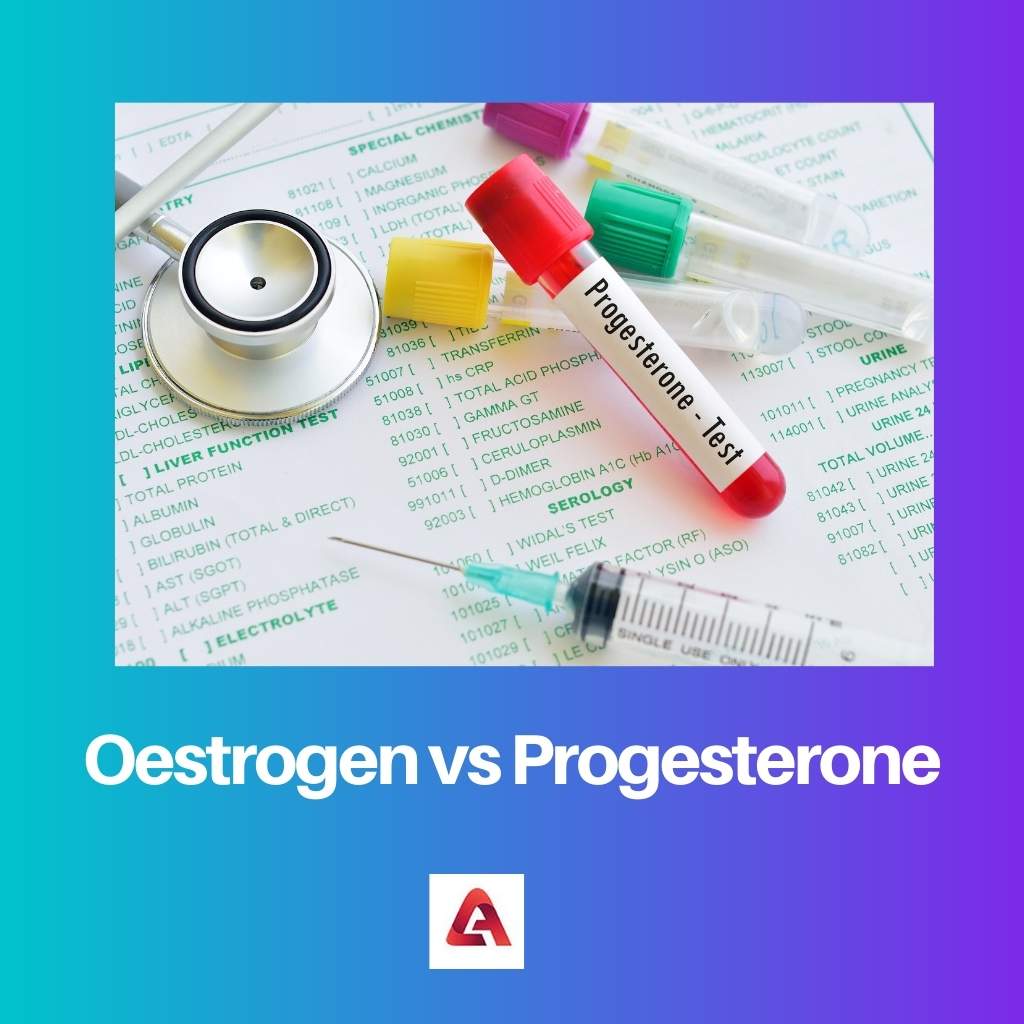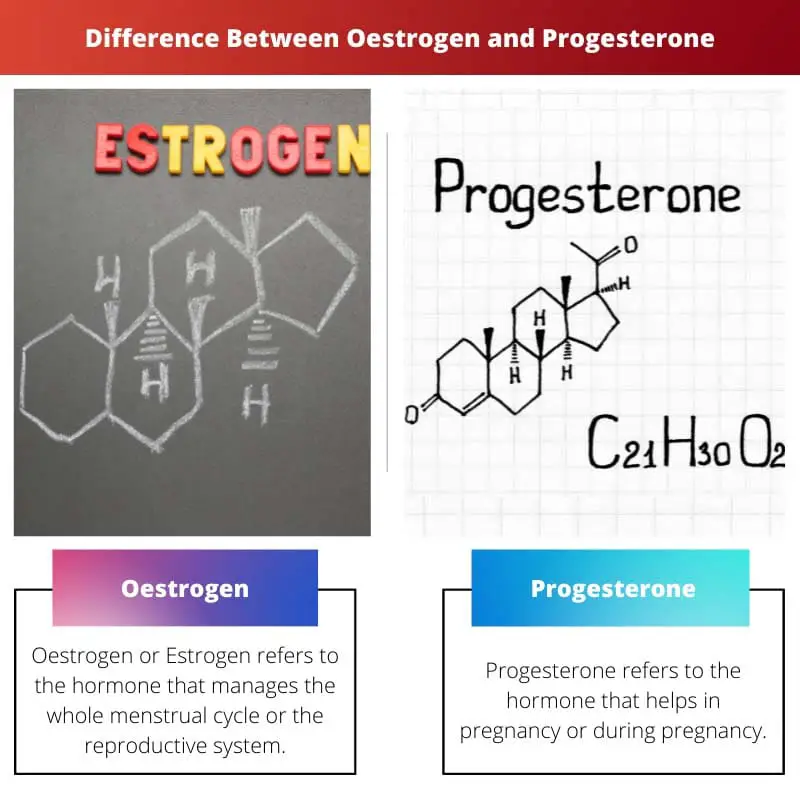Oestrogen and Progesterone refer to the two hormones present in the female body. Hormones are the chemical signals that are secreted into the blood and further carried out to different organs for their respective functioning.
Oestrogen and Progesterone are the two hormones that help to regulate a women’s menstrual cycle. It also plays a chief role in pregnancy or getting pregnant.
Hence, these two hormones play a crucial role in the reproductive system.
In other words, Oestrogen and Progesterone play an important role during the whole childbearing stage, that is, from the start of the menstrual cycle till menopause.
These two hormones are secreted by the ovarian gland during different periods.
Key Takeaways
- Oestrogen and progesterone are female sex hormones that play vital roles in the menstrual cycle, pregnancy, and overall reproductive health.
- Oestrogen is responsible for the development of female secondary sexual characteristics and for regulating the menstrual cycle.
- Progesterone prepares the uterus for pregnancy, supports fetal development, and helps maintain pregnancy.
Oestrogen vs Progesterone
Estrogen is a group of female hormones that are produced primarily in the ovaries but also in small amounts in the adrenal glands and fat cells. It plays a key role in the development of female sexual characteristics. Progesterone is a hormone that is produced primarily in the ovaries after ovulation. Its main function is to prepare the uterus for pregnancy by thickening the lining.

Oestrogen or also known as Estrogen, is one of the female hormones. Its main job is to manage the menstrual cycle of a woman.
The Estrogen hormone is secreted before the process of ovulation by the ovaries. Also, the secretion of this hormone is dependent upon the Follicle Stimulating Hormone (FSH).
On the other hand, Progesterone is the other hormone that is present in the female body. This hormone helps in pregnancy or during pregnancy.
Progesterone hormone is secreted after the process of ovulation by the ovaries. Also, the secretion of this hormone is dependent upon the Luteinizing Hormone (LH).
Comparison Table
| Parameters of Comparison | Oestrogen | Progesterone |
|---|---|---|
| Definition | Oestrogen or Estrogen refers to the hormone that manages the whole menstrual cycle or the reproductive system. | Progesterone refers to the hormone that helps in pregnancy or during pregnancy. |
| Hormones that Control the Secretion | The secretion of Oestrogen is controlled by the Follicle Stimulating Hormone (FSH). | The secretion of Progesterone is controlled by the Luteinizing Hormone (LH). |
| Function | Manages the menstrual cycle or reproductive cycle. | Helps during pregnancy. |
| Function During Pregnancy | Oestrogen helps in the enlargement of the breast, regulates breast tenderness and enlargement of the uterus during pregnancy. | Progesterone helps in restoring the mammary glands. |
| Blood Clotting | Oestrogen increases the rate of blood clotting. | Progesterone decreases the rate of blood clotting. |
| Breast Cancer | Oestrogen increases the level of blood cancer. | Progesterone decreases the level of blood cancer. |
What is Oestrogen?
Oestrogen or also known as Estrogen, is one of the female hormones. Its main job is to manage the menstrual cycle of a woman.
An average menstrual cycle is of 28 days to 45 days, depending on the woman. Oestrogen hormone is secreted from the ovaries.
Oestrogen hormone has secreted before the process of ovulation. Ovulation is the process of fertilizing the egg from the ovaries.
The secretion of the hormone also depends upon some kind of hormone known as Follicle Stimulating Hormone (FSH).
During pregnancy, a woman goes through a lot of changes, both physically and mentally. The Oestrogen Hormone is responsible for physical changes like the enlargement of the breasts, breast tenderness, and enlargement of the uterus.
Oestrogen has other functions like secondary sex characteristics, like the development of the breast, hair growth in different parts, widening of the hip region, ability to nurse children, menstrual cycle, etc.
Oestrogen has other features as well. The Oestrogen hormone increases the rate of blood clotting.
Also, it increases the level of breast cancer. Proper food and nutrition are required during the menstrual cycle and before the cycle.
The required nutrients control the level of Oestrogen and hence, decrease the level of blood clotting and breast cancer. Also, physical exercise is one of the important aspects of controlling hormones.
What is Progesterone?
Progesterone is also one of the female hormones. There are mainly two types of hormones.
The main job of Progesterone is to help in pregnancy and during pregnancy. During pregnancy, a woman has to take a lot of care, especially of the Progesterone hormone, as it can lead to miscarriages.
Actually, not only during pregnancy but also Progesterone is also responsible for getting pregnant. Progesterone hormone is also secreted from the ovaries.
Also, the secretion of this hormone is dependent upon the Luteinizing Hormone (LH).
During pregnancy, the Progesterone hormone helps in restoring the mammary glands. The mammary gland is present in the breasts of females.
It helps in the production of milk to feed the child. There are a total of two complex mammary glands in each breast and 10-20 simple mammary glands.
Progesterone decreases the rate of blood clotting. Also, it reduces the chances of breast cancer.
Some other benefits of Progesterone are it reduces hot flashes and vaginal dryness, fightbacks fatigue, and it also improves mood and sleep, fights weight gain, alleviates skin dryness and wrinkling, etc.
Main Differences Between Oestrogen and Progesterone
- Oestrogen or Estrogen refers to the hormone that manages the whole menstrual cycle or the reproductive system. On the other hand, Progesterone refers to the hormone that helps in pregnancy or during pregnancy.
- The secretion of Oestrogen is controlled by the Follicle Stimulating Hormone (FSH). On the other hand, the secretion of Progesterone is controlled by Luteinizing Hormone (LH).
- The function of Oestrogen is to manage the menstrual cycle or the reproductive system. On the other hand, the function of Progesterone is to help in pregnancy or during pregnancy.
- Oestrogen helps in the enlargement of the breast and regulates the breast tenderness and enlargement of the uterus during pregnancy. On the other hand, Progesterone helps in restoring the mammary glands during pregnancy.
- Oestrogen increases the role of blood clotting. On the other hand, Progesterone decreases the rate of blood clotting.
- Oestrogen increases the level of breast cancer. On the other hand, Progesterone decreases the level of breast cancer.

- https://breast-cancer-research.biomedcentral.com/track/pdf/10.1186/bcr452.pdf
- https://www.sciencedirect.com/science/article/pii/S096007601000004X

Estrogen and progesterone are fundamental to female reproductive processes. Their regulatory functions are paramount for ensuring optimal menstrual and pregnancy outcomes.
Absolutely, the intricate roles of estrogen and progesterone underscore the complexities of female physiology and the delicate balance required for maintaining reproductive health.
The functions of estrogen and progesterone during pregnancy are vital. Their impact on physical and physiological changes is remarkable, underscoring their critical roles in reproductive health.
The dynamic changes orchestrated by estrogen and progesterone during pregnancy are truly remarkable, highlighting the intricate influence of these hormones.
The diverse functions of estrogen and progesterone during pregnancy and the menstrual cycle underscore their pivotal roles in female reproductive health. Achieving a delicate balance of these hormones is crucial for optimal well-being.
The interactions between estrogen and progesterone are crucial for ensuring the maintenance of women’s reproductive health, necessitating a thorough understanding of their functions.
The intricate regulation of estrogen and progesterone secretion is central to maintaining proper reproductive function, highlighting the complexities of female endocrinology.
Oestrogen and Progesterone are central to the female body, particularly during the childbearing stage. Their functions are essential for maintaining reproductive health.
It’s fascinating to delve into the intricate biological processes controlled by these hormones. The importance of their functions cannot be overstated.
Understanding the roles of estrogen and progesterone sheds light on the complexity of female physiology. Their influence extends far beyond the reproductive system.
Estrogen and progesterone secretion is regulated by specific hormones, highlighting the interconnectedness of the endocrine system. This interplay is crucial for maintaining optimal reproductive function.
The tightly regulated secretion of estrogen and progesterone underscores the precise orchestration of the female reproductive processes.
Estrogen and progesterone are essential to control the female body, especially during the menstrual cycle and pregnancy. These hormones must be kept in balance to ensure proper reproductive health.
I completely agree. Balanced levels of estrogen and progesterone are crucial for women’s health.
The impact of these hormones on a woman’s body is truly remarkable. The menstrual cycle and pregnancy are both regulated by them, highlighting their importance.
Estrogen and progesterone are produced by the ovaries and play a significant role in female reproductive health. Their interplay is complex and fascinating.
You’re absolutely right. The intricate relationship between these hormones is a testament to the complexity of the female reproductive system.
The balance of estrogen and progesterone is crucial, and any disruption can have significant implications for a woman’s health.
The roles of estrogen and progesterone in the female body are indispensable, especially during pregnancy. Their comprehensive functions are fundamental for maintaining reproductive health.
The extensive influence of estrogen and progesterone on female reproductive health emphasizes the need for a holistic understanding of their multifaceted functions.
The intricate functions of estrogen and progesterone in pregnancy highlight the complexities of female reproductive physiology and the crucial regulatory roles of these hormones.
The regulation of estrogen and progesterone secretion is complex and essential for maintaining reproductive health. Understanding their roles provides valuable insights into female physiology and health.
The delicate interplay between estrogen and progesterone highlights the intricacies of the female reproductive system and the regulatory mechanisms linked to these hormones.
The multifaceted functions of estrogen and progesterone underscore their profound impact on female health and well-being, necessitating a comprehensive understanding of their roles.
The roles of estrogen and progesterone in the menstrual cycle and pregnancy are multifaceted. Their effects extend beyond these reproductive processes and have broader implications for women’s health.
The holistic impact of estrogen and progesterone on female health is a testament to the intricate interplay between hormones and bodily functions.
Absolutely, the intricate functions of these hormones have profound effects on women’s overall well-being, emphasizing the need for a comprehensive understanding of their actions.